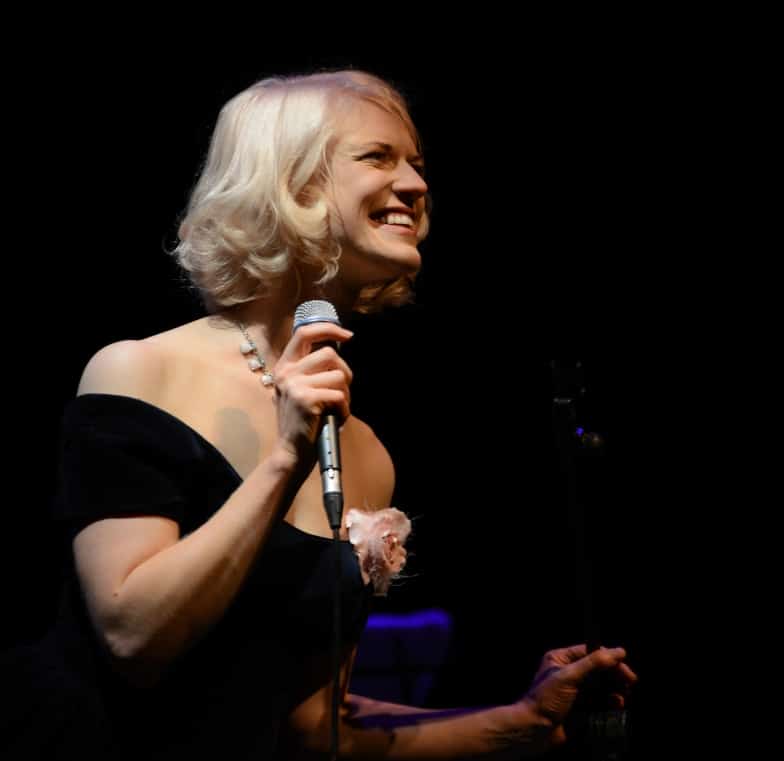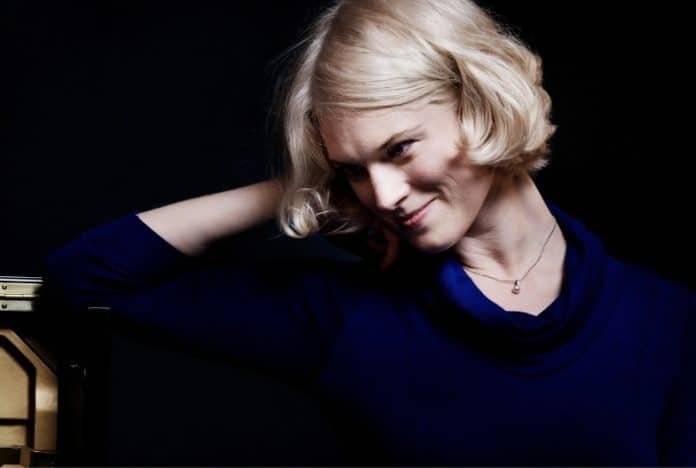Born out of the injustice of slavery, the story of jazz is written into the quest for human dignity, democracy and civil rights. It has given strength to the struggle against discrimination and oppression across the globe and has a unique power of bringing people together.
To celebrate International Jazz Day (30 April), UNRIC spoke with Irish vocal jazz artist Emilie Conway about the values of jazz and her disability rights activism.
An inclusive community
While studying English and German literature at Trinity College Dublin, Emilie spent a summer in Chicago. During her stay, she discovered her love of jazz music and the openness and creativity of the jazz community.
“Because of my visual impairment, I couldn’t get a job doing any of the typical student work, [such as] waitressing. So, one day, on the way back from another interview where, yet again, I didn’t get the job, I stopped to listen to a guy busking in the subway. For some reason he offered me his guitar and invited me to sing. I sang and people threw in dollars. He said, ‘hey don’t you go putting me out of a job now!’ He was very kind, and his encouragement got me out busking in subways which introduced me to a lot of musicians.”
Her stage debut was an impromptu session at the iconic Chicago Green Mill Jazz Club where American jazz singer Kurt Elling was performing with fellow star Jon Hendricks.
“After [Kurt Elling’s] set, there was a jam session. Ignorance and innocence can be a gift and so when the call out for musicians came to jam, my friends volunteered me and up I went. I remember Kurt’s pianist Laurence Hobgood helped me get my key, B-flat for Secret Love. And there I was for my debut, singing on one of the most legendary jazz stages in the world!”
The trip to Chicago marked a turning point in Emilie’s life.
“I was finding out how much I couldn’t do because of my visual impairment, but I was also finding out in art and music how much I could do.”
Equality defines jazz
Emilie will always be grateful for the “welcome and openness” of Kurt Elling and the fellow Chicagoan musicians who encouraged her. This community spirit is a product of jazz music’s defining principle of equality.
“It’s about creating something greater than some of its parts. It’s not about the singer, it’s not about the bass, it’s about the whole group working together. […] No one person is more important than the other.”

Transcending divides
Born in the United States and rooted in African traditions, jazz’s universal principles have allowed it to travel the world. Today, jazz music transcends cultural, linguistic and generational divides to bring people together.
“Jazz has values”, says Emilie, citing the genre’s origins and tradition of improvisation.
Improvising relies on musicians listening and responding to each other, which for Emilie, creates unique connections and develops mutual respect. These connections have allowed her to perform across the world and discover different musical traditions and ideas.
“Whether with American musicians or Danish or German […] It’s the same kind of ideology, religion or approach and that’s what makes it so universal.”
Overcoming barriers
Although the jazz community has accepted Emilie with open arms, she shares how the music industry, and society in general, have not always been so welcoming of artists with disabilities. Work in the arts sector is often precarious, and Emilie highlights how having a disability only heightens this: it’s “precarity squared”.
On top of her visual impairment, stress and fatigue can cause her corneal condition and hearing impairment to flare up, which not only takes away her music, but also her independence.
“In the arts sector, you need to not only be competitively talented but competitively healthy. And where, as disabled artists, we may be able to compete on talent, we cannot compete on health.”
The COVID-19 pandemic only exacerbated these problems. United Nations Secretary-General António Guterres stressed that it “laid bare the persistent barriers and inequalities faced by the world’s one billion persons with disabilities.”
Emilie’s own experiences during the pandemic spurred her to speak out about disability rights. This created what she calls her own #MeToo moment as others started coming forward with similar stories and marked the beginning of the Disabled Artists and Disabled Academics Campaign for Human and Cultural Rights (DADA). The Irish group co-founded by Emilie, highlights and challenges the barriers that prevent people with disabilities from participating in arts, culture and society.
“There needs to be consistent, sustained, secure support for disabilities and we need to be able to count on that in order to grow. And currently that isn’t the case. […] There are a lot of people who have disabilities who will be too afraid to show their work because it might involve them losing support for their disabilities,” she says, adding that this is an issue across Europe.
Activism and jazz go hand in hand
Emilie’s activism has led her to newly appreciate the roots of jazz.
“Jazz music has always been about freedom and rights and an eloquent expression to counter oppression and discrimination. When I’m doing a lot of campaigning work, I’m going back listening to Blues musicians, Billie Holiday, Abbey Lincoln and artists like this because they were singing about similar issues.”
Following in the footsteps of her musical heroes, Emilie uses jazz to fight against injustice and often sings her message at conferences and events.
“On International Jazz Day, I want to express my gratitude for this amazing music. For those who created it, its journey through racial oppression and discrimination to become a voice of eloquence, freedom, authenticity and respect — and joy!”
See also:

